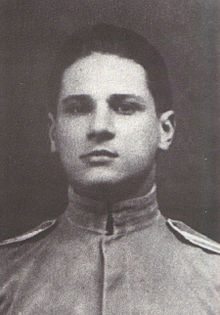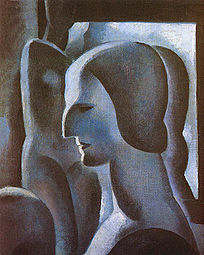
Ismael Nery (October 9, 1900 – April 6, 1934) was a Brazilian artist.
Biography
Background
Born in Belém, Pará, of Dutch, Native-Brazilian, and African ancestry, he studied at the Escola Nacional de Belas Artes (National School of Fine Arts) in Rio de Janeiro and at the Académie Julian in Paris. He created numerous paintings, wrote many poems and also helped design Brazil's National Patrimony of the Treasury department. Nery married a poet, Adalgisa Nery, in 1922. He contracted tuberculosis in 1931, and died of it in 1934. His iconic work is Autorretrato, 1927 (Autorretrato Rio/Paris) , a surrealist painting commonly compared to the Green Violinist of Marc Chagall. Nowadays Autorretrato, 1927 (Autorretrato Rio/Paris) is exhibited by MASP.

Life
Nery was born in 1900, and his family settled in 1909 in Rio de Janeiro. In 1915, he joined the National School of Fine Arts. He traveled to Europe in 1920, and attended the Académie Julian in Paris. Back in Brazil, he worked in the architecture section of the National Heritage service at the Ministry of Finance, where he became friends with the poet Murilo Mendes. In 1922, he married Adalgisa Ferreira. In this period, he produced works with an expressionist tendency.
His favorite themes are always linked to the human figure: portraits, self-portraits and nudes. He is not interested in national, indigenous and Afro-Brazilian themes. It diversifies the techniques used. He is also a scenographer. In 1929, he had two solo exhibitions, in Belém and Rio de Janeiro. The welcome disappoints him. He also participates in a group exhibition of Brazilian painting in New York.
Sickness and death
That same year 1929, after a trip to Argentina and Uruguay, a diagnosis revealed that he was carrying tuberculosis, which forced him to live in a sanatorium for two years. He comes out, apparently neat. He participated in a few shows, such as the Salão Revolucionário in Rio de Janeiro in 1931 and the Exposição de Arte Moderna da SPAM in São Paulo in 1933. But in 1933, the disease returned irreversibly. He died in 1934, at the age of thirty-three, in Rio de Janeiro, at a time when his notoriety beyond the circle of connoisseurs was still nascent. He is buried dressed in Franciscan, in a homage of the monks to his ardent Catholic faith.
Legacy
In 1959, Adalgisa Nery published an autobiographical novel, A Imaginária , which became a bestseller. The book relates in particular the common years with Ismael Nery. Adalgisa Nery describes the fascination she initially felt for her husband, but also their agitated relationship, the internal torments of Ismael Nery, and her violence in everyday life.
Ismael Nery's work was forgotten by the public and critics until the 1960s, when his name was inscribed on the Biennale of São Paulo, In the room devoted to surrealism and fantastic art. His works were also exhibited in the 10th Biennale. In 1966 in Rio de Janeiro, and in 1984, at the Museum of Contemporary Art of the University of São Paulo (Ismael Nery Retrospective - 50 years later), two retrospectives of his creations were presented.
Gallery
- Ismael Nery's works
-
 Ismael Nery - Namorados, circa 1927
Ismael Nery - Namorados, circa 1927
-
 Figura, 1927 (Museu de Arte Contemporânea da Universidade de São Paulo).
Figura, 1927 (Museu de Arte Contemporânea da Universidade de São Paulo).
-
 Desejo de Amor
Desejo de Amor
-
 Selfportrait with Adalgisa
Selfportrait with Adalgisa
-
 Composition
Composition
-
 Adalgisa
Adalgisa
-
 Figura com cubos, z.d.
Figura com cubos, z.d.
-
 Mulher Nua Ajoelhada, ca. 1930
Mulher Nua Ajoelhada, ca. 1930
-
 Auto-retrato, 1927
Auto-retrato, 1927
-
 Nu feminino, 1925
Nu feminino, 1925
-
 Nu, z.d.
Nu, z.d.
Notes
- Quint, Anne-Marie (2002). Escrevo-lhe (in French). Presses Sorbonne Nouvelle. ISBN 978-2-87854-246-2.
- ^ Cultural, Instituto Itaú. "Ismael Nery". Enciclopédia Itaú Cultural (in Brazilian Portuguese). Retrieved 2020-05-13.
- www.sescsp.org.br https://www.sescsp.org.br/online/artigo/compartilhar/3106_A+LUTA+DE+DUAS+ESCRITORAS+PARA+VENCER+O+PRECONCEITO. Retrieved 2020-05-13.
{{cite web}}: Missing or empty|title=(help)
- Brazilian painters
- Brazilian people of Dutch descent
- Brazilian people of indigenous peoples descent
- 20th-century deaths from tuberculosis
- Modern painters
- Académie Julian alumni
- 1900 births
- 1934 deaths
- 20th-century Brazilian architects
- Brazilian people of African descent
- Tuberculosis deaths in Rio de Janeiro (state)